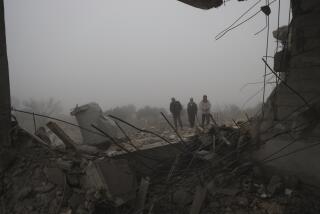U.S. Gave Data to Iraq 3 Months Before Invasion : Persian Gulf: Documents show intelligence sharing with Baghdad lasted longer than previously indicated.
The Bush Administration shared intelligence information with the regime of Saddam Hussein until at least May, 1990, three months before Iraq’s invasion of Kuwait, according to formerly classified documents.
The intelligence cooperation continued far longer than previously indicated and occurred during a time when Hussein was taking an increasingly belligerent posture in the Persian Gulf region.
The Bush Administration justified continuing to provide Iraq with information on Iranian military activities and other intelligence data as a means of retaining access to elements of the government in Baghdad, according to the documents.
Last fall, a Senate Intelligence Committee report indicated that the panel believed the intelligence sharing ended in 1988 with a cease-fire in the Iran-Iraq war. The committee had received a number of secret briefings by Administration officials on policy toward Iraq.
A committee spokesman declined to comment on the apparent discrepancy Monday, saying only: “We are looking at all the facts.”
Iraq began to receive intelligence on Iranian troop movements and other critical issues during the Ronald Reagan Administration as part of the “tilt” toward Iraq during the eight-year war.
Some intelligence experts have speculated that the information later helped Iraq learn how to shelter its weapons from U.S. surveillance during Operation Desert Storm, since the Iraqis knew the types of intelligence available to U.S. agencies.
While the committee report indicated that the panel believed the cooperation had ended with the Iran-Iraq war, the previously classified State Department document dated May 16, 1990, says that the sharing only slowed down after the August, 1988, cease-fire.
That report, addressed to White House National Security Adviser Brent Scowcroft, was prepared to present various options on Iraqi policy for consideration at a May 24, 1990, meeting of the White House National Security Council’s deputies committee. It set out reasons for continuing the cooperation and for stopping it.
“Intelligence exchanges have waned since the Gulf War cease-fire,” said the report. “PRO: They still provide Iraq with limited information on Iranian military activity that would be missed. CON: Ending this contact would close off our very limited access to this important segment of the Iraqi establishment.”
The State Department paper indicated that officials at the high-level interagency meeting were going to consider whether to continue the intelligence sharing. The chairman of the deputies committee was Robert M. Gates, now CIA director, who then was President Bush’s deputy national security adviser.
Mark Mansfield, a spokesman at the CIA, declined to comment on the documents. “We don’t comment on the nature and extent of intelligence arrangements with any countries,” he said.
Attempts to obtain comment from the White House were unsuccessful.
The State Department paper and related documents from the NSC were made public Monday by Rep. Henry B. Gonzalez (D-Tex.), chairman of the House Banking, Finance and Urban Affairs Committee, during a statement on the floor of the House.
The committee is one of a number of congressional committees examining the covert policies by the Reagan and Bush administrations to assist Hussein from the early 1980s until almost the eve of his invasion of Kuwait on Aug. 2, 1990. The committees also are examining whether the Administration provided accurate information to Congress on the Iraqi assistance.
“The revelation that intelligence sharing with Iraq continued well into 1990 . . . raises new questions about the Administration’s reporting to the Senate and House Intelligence committees,” said Gonzalez. “Based on the fact that the Senate committee report on the Gates nomination contains a misleading date for the end of the intelligence-sharing arrangement, I wonder if they were properly informed.”
In 1984, President Reagan signed a National Security Decision Directive authorizing the CIA to share limited intelligence with Iraq, according to the report issued last fall by the Senate Intelligence Committee. Two congressional sources said the committee was told that the first intelligence was shared with Baghdad in December, 1984.
However, the New York Times reported in January that the Reagan Administration had actually begun providing intelligence to Iraq in the spring of 1982. The account quoted a former CIA official as identifying Gates as the CIA officer in charge of preparing the intelligence information for Iraq.
During his confirmation hearings last fall, Gates testified that intelligence data was passed to Baghdad to prevent Iraq from losing the war with Iran. Gates said that the intelligence sharing was carried out “to enhance their (Iraq’s) ability to pursue the war.”
At his hearings, Gates did not discuss a date when the cooperation ended. But during the hearings, the Senate Intelligence Committee released the report on Iraqi intelligence sharing, which indicated that it had ended in 1988. “Intelligence sharing continued on a sporadic basis until 1988 when the war between Iraq and Iran ended,” said the report.
During confirmation hearings for Gates, Sen. Bill Bradley (D-N.J.) raised questions about whether the cooperation with Iraq amounted to a “covert action” that the President was required by law to report to Congress.
A 1975 law prohibits the use of CIA funds for covert activities “unless and until the President finds that each operation . . . is important to the national security of the U.S. and reports in a timely fashion” to the House and Senate Intelligence committees.
More to Read
Start your day right
Sign up for Essential California for news, features and recommendations from the L.A. Times and beyond in your inbox six days a week.
You may occasionally receive promotional content from the Los Angeles Times.






